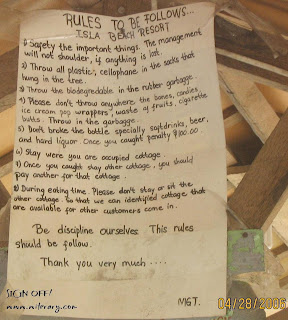The Goethe Institut screened all six of Barua's films yesterday. Described as being "defined by sophisticated aesthetics and the exploration of memory and history through narrative forms," the films were screened after a brief introduction and several acknowledgements to members of the audience.
The emcee made reference to Barua's "double or triple heritage," Barua being half Polish and half Kenyan, and questioned Barua about how being a global citizen allows him to give back, respond to or take a stand on issues in Kenya.

Barua answered with several thoughts;
- that as artists we try to create things that are very universal while being very particular,
- that in art every single observation, if it rings true for you is true, that there is no one interpretation of a piece of work.
I wasn't able to stay beyond the 15 min break and sadly I have already forgotten more of Barua's reflections on his films but indeed he takes a very a European slant in his filmmaking with undertones and the artistic courage reminiscent of his countrymate, Krzysztof Kieslowski's style.
Light & Form
There is harmony and order that is to be found in the inanimate structures that surround us in our daily lives. But how often do we stop to look at or think about them, having very often taken them for granted? In our homes, workplaces and public spaces there is a constant tension between balance and chaos, and much of our daily endeavours revolve around this contradiction. This is most readily apparent in the buildings and cities that we construct and inhabit. We concentrate on their functionality and pay only cursory attention to how they interact with our sense of perception and the resultant effect on our thoughts and feelings and our ability to relate to our surroundings. Photography is an incredibly dexterous medium when it comes to exploring this interrelation. Yet like all art, photography is a construct of the mind rather than an embodiment of any particular physical reality. Through its ability to extract, as it were, fragments of a larger and therefore less decipherable ‘reality’, and reducing it to the essence of almost abstract form, it opens us to a different way of evaluating the external world. There is beauty and order everywhere, and this is only determined by how we choose to direct our attention. Form, when combined with the ethereal quality of light, allows for the animation of every object. And this is just one more way of cherishing the little joys that the gift of life has is stow for us each day, where even concrete, stones, glass and metal, reaffirm the act of Creation.
Jacob Barua
Filmography:
Forgotten Places, 1994, documentary, 20 mins.
Shades of Poland, 1999, documentary, 53 mins.
Taking Action, 2002, documentary, 30 mins.
Valley of Shadows, 2004, film poem, 2 mins.
My Daddy was a Cavalryman, 2006, documentary, 25 mins.
 Freedom is a common theme in art, whether from the reigns of society or from our own personal bondage.
Freedom is a common theme in art, whether from the reigns of society or from our own personal bondage. But even freedom isn't absolute. And wars are won and lost. So if women are to triumph, pray, what would have been lost?
But even freedom isn't absolute. And wars are won and lost. So if women are to triumph, pray, what would have been lost?
















